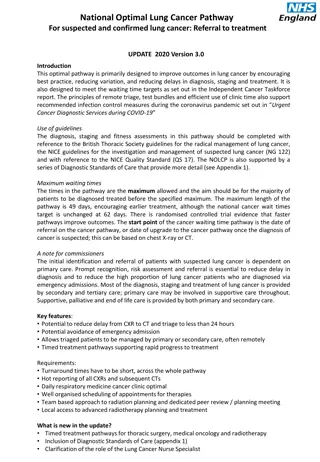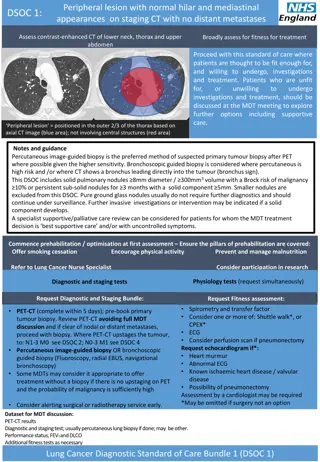Understanding Cancer Staging: Purpose, Sources, and Systems
Cancer staging is crucial in assessing the extent of cancer, determining appropriate treatment, and predicting prognosis. This process involves various sources such as physical exams, radiology scans, and pathology reports. Major staging systems like SEER and AJCC help classify cancer stages. Different methods of cancer spread and the significance of staging in treatment decisions are discussed, emphasizing the importance of accurate staging for optimal patient care.
Download Presentation

Please find below an Image/Link to download the presentation.
The content on the website is provided AS IS for your information and personal use only. It may not be sold, licensed, or shared on other websites without obtaining consent from the author. Download presentation by click this link. If you encounter any issues during the download, it is possible that the publisher has removed the file from their server.
E N D
Presentation Transcript
Objectives Define cancer staging Discuss the purpose of staging Identify staging sources Review major staging systems
Methods of Cancer Spread Invasion beyond adjacent tissue into other organs Lymphatic wall cancer cells travel through lymphatic vessels Blood-borne metastases invasion of blood vessels
Staging Common language Developed by medical professionals Communicates cancer information Evolved over many years Different staging systems Extent of cancer
Purpose of Staging Assess extent of cancer Determine most appropriate treatment Cure disease Decrease tumor burden Relieve symptoms Prognosis of individual patient Compare local treatment results with national data
Staging Sources Physical examination Radiology scans Endoscopic procedures Pathologic examination of tissue
Pathologic Examination Needle biopsy Fine needle aspirate (FNA) Incisional and excisional biopsy Bone marrow biopsy Surgical resection Primary site of cancer Regional lymph nodes
Pathology Report Primary site Tumor size Histologic type Grade of tumor Extent of cancer within organ and beyond Lymph nodes removed and positive Biopsy or resection of distant site(s)
Staging Systems SEER (Surveillance, Epidemiology and End Results) Summary Stage AJCC (American Joint Committee on Cancer) Cancer Staging
SEER Summary Stage Main Categories In situ Localized Regional Distant Benign/Borderline Unknown
In Situ Stage Basement membrane Epithelium of organ Parenchyma of organ In situ cancer cell Source: SEER - Adapted from an illustration by Brian Shellito of Scientific American, as printed in Cancer in Michigan, The Detroit News, Nov. 1-2, 1998.
Localized Stage Epithelial cells Basement membrane Invasive tumor Stroma (invading the basement membrane and extending into the stroma) (or parenchyma) Source: SEER - Adapted from an illustration by Brian Shellito of Scientific American, as printed in Cancer in Michigan, The Detroit News, Nov. 1-2, 1998.
Regional Stage Epithelium Basement membrane Capillary Parenchyma of organ Invasive tumor cell Blood or lymph vessel Source: SEER - Adapted from an illustration by Brian Shellito of Scientific American, as printed in Cancer in Michigan, The Detroit News, Nov. 1-2, 1998.
Distant Stage Development of Metastasis Epithelium Secondary tumor site Basement membrane Tumor cell penetrates capillary wall Blood or lymph vessel Epithelial lining of vessel Metastatic cell in circulation Tumor cell adhering to capillary Source: SEER Adapted from an illustration by Brian Shellito of Scientific American, as printed in Cancer in Michigan, The Detroit News, Nov. 1-2, 1998.
AJCC Cancer Staging Classification Components T = Primary Tumor Size and invasion N = Regional Lymph Nodes Presence or absence of tumor in lymph nodes M = Distant Metastasis Presence or absence of distant metastases Stage Group assigned using table
Staging Summary Sources are available to stage cancer Treatment is based on extent of cancer Several major staging systems used Prognosis of cancer can be established End result analysis of cancers
Thank You! NCRA Education Foundation www.ncraeducationfoundation.org NCRA www.ncra-usa.org























